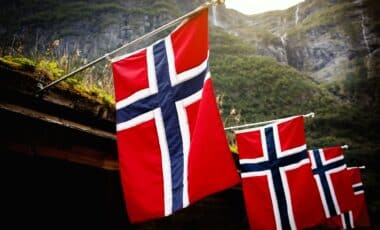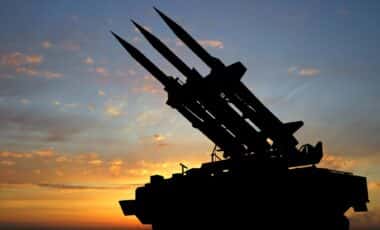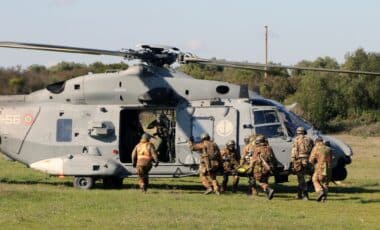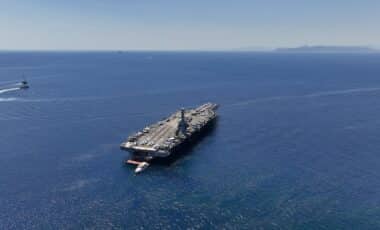On the morning of July 25, 1943, King Victor Emmanuel who had backed Benito Mussolini ever since his March on Rome in 1922 told Il Duce, “The game is over, Mussolini . . . you’ll have to go.” Upon leaving the king’s villa, a carabinieri captain arrested Mussolini who took him to a secret location in Rome “for his protection.”
Two days later, Il Duce was on the island of Ponza forty miles off the coast of Naples. With no small amount of irony, Mussolini was under house arrest on the island where enemies of the Fascist state had once been exiled. Thus began a high-stakes game of hide-and-seek with the ex-dictator, with the new Italian government under Marshal Pietro Bagdolio constantly moving him to prevent his rescue by the Germans and Adolf Hitler equally determined to free his former mentor.

SS-Sturmbannführer Otto Skorzeny (Credits: Bundesarchiv – 101III-Alber-183-25 – Kurt Alber)
On the day of Mussolini’s ouster, SS-Hauptsturmführer Otto Skorzeny, commander of SS-Jagdverbande 502 (Hunting Group 502), Germany’s only special operations unit, was relaxing at a Berlin hotel when he received orders to report immediately to Rastenburg. Together with five other officers from different units, Skorzeny soon found himself being interrogated by Adolf Hitler. Finally, Hitler asked all of their opinion of the Italian people. The other five officers responded with Axis-solidarity platitudes. The Viennese Skorzeny looked at his fellow Austrian and said, “I am an Austrian, mein Führer, and our attitude toward Italy is prejudiced by the happenings of the previous World War and by South Tyrol.”
Hitler dismissed all but Skorzeny. Hitler then gave him top-secret orders. With everyone expecting the new Italian government to soon surrender to the Allies, Hitler ordered Skorzeny to rescue Mussolini as quickly as possible. For the mission, code-named Operation Eiche (Oak), Skorzeny and his men would report directly to Luftwaffe General Kurt Student who would provide all the necessary support.

Hotel Campo Imperatore (Credits: Bundesarchiv – 101I-567-1503A-05 – Toni Schneiders)
Skorzeny’s efforts to find Il Duce became a frustrating and harrowing series of false leads, near misses, and escapes from death by Allied fighters. In late August, Skorzeny received intelligence indicating that Mussolini was being held in the Campo Imperatore Hotel, part of a central Italy ski resort on the Gran Sasso and located on a plateau roughly 6,300 feet above sea level. As ground access was by funicular Skorzeny determined only an air assault would work. The thin atmosphere at that altitude negated a parachute drop. Skorzeny and Student agreed that the only assault possible was by gliders landing on what appeared to be a triangular patch of grass near the hotel.
The plan they devised called for Skorzeny to lead an aerial assault composed of twelve gliders. Simultaneously, Major Hans Mors, leading a parachute battalion, would secure the base of the funicular and send up reinforcements. In addition, Skorzeny would have with him carabiniere General Ferdinando Soleti who, it was hoped, would convince guards not to shoot.

Glider planes near Hotel Campo Imperatore. (Credits: Bundesarchiv – 101I-567-1503B-23 – Tony Schneiders)
On September 12, 1943, four days after the Italian armistice was announced, Operation Oak was launched. Immediately problems arose. Because the gliders arrived late, the 0700 departure was delayed until 1300. Then, during takeoff the first two gliders struck bomb craters from a recent Allied air raid and crashed. Finally, as the gliders approached the landing zone, Skorzeny discovered that the level patch of grass seen in the high-level reconnaissance photos was actually a rock-strewn incline. Countermanding orders to abort in such a situation, Skorzeny shouted to the pilot, “Dive—crash-land as near to the hotel as you can!”
With heroic effort, the pilot landed the glider thirty feet from the hotel. As the other gliders made their approach, Skorzeny, General Soleti, and the handful of commandos from the glider rushed into the hotel.
Three minutes later, Skorzeny stood before Mussolini and said, “Il Duce, the Führer has sent me to free you.” Mussolini hugged him and said, “I knew my friend Adolf Hitler would not leave me in the lurch.” Not a shot had been fired.

Skorzeny with the liberated Mussolini on 12 September 194. (Credits: Bundesarchiv – 101I-567-1503C-15 – Toni Schneiders)
Because a land trip to Rome was judged too dangerous, a lightweight Fieseler Storch, the only airplane capable of landing on the small clearing by the hotel, was summoned. Though designed to only carry two people, Skorzeny squeezed into the fuselage and the overloaded airplane successfully took off for Rome on the first leg of a flight to Berlin. When Skorzeny and Mussolini reached Vienna, Skorzeny received a call from an ecstatic Hitler who said, “Today, you have carried out a mission that will go down in history.” Skorzeny received the Knight’s Cross (Ritterkreuz des Eisernen Kreuzes) and was promoted to SS-Sturmbannführer (Major). This, and further exploits, would earn Skorzeny the sobriquet “the most dangerous man in Europe.”
For those interested, Otto Skorzeny’s memoirs can be read in the book My Commando Operations: The Memoirs of Hitler’s Most Daring Commando (Schiffer Military History)








